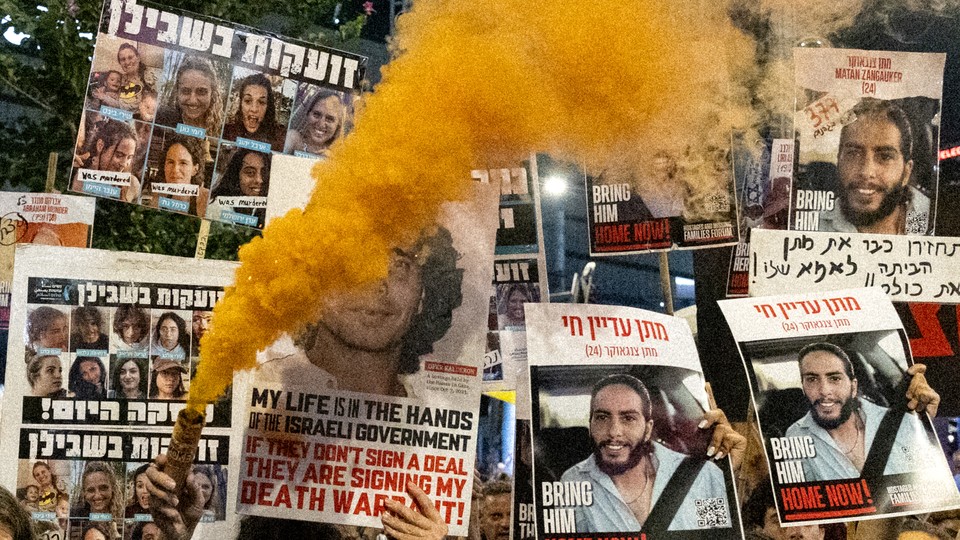The ‘Moment of Chaos’ That Hostage Families Were Waiting For
5 min read
In what turned out to be the last few months of Yahya Sinwar’s life, U.S. and Israeli officials worried that the architect of the October 7 attacks might never free the hostages they believed he had hidden in the twisting tunnels of Gaza. Sinwar had essentially abandoned negotiations over a durable cease-fire and the accompanying release of the 100-plus captives, as well as fresh aid for Palestinians and the chance to rebuild their obliterated territory with international help. American and Israeli intelligence officials, who had no direct contact with Sinwar and communicated via intermediaries, told me they weren’t sure if they were dealing with a rational actor ready to end his people’s suffering or a fanatic with a death wish.
Sinwar’s chance encounter on Wednesday with an Israeli military patrol, whose soldiers did not immediately realize that they had killed their country’s most wanted man, has inspired a cautious optimism. These are early days, but the “chief impediment” to freeing the hostages and bringing some peace to Gaza is gone, one U.S. official told me. Whether any of this happens hinges on the decisions of two men: Sinwar’s yet unnamed replacement and Israeli Prime Minister Benjamin Netanyahu.
En route to Germany for a conference on the war in Ukraine, President Joe Biden phoned Netanyahu from Air Force One to congratulate him on the military operation, urging his fellow leader to “use this moment to bring the hostages home and to bring the war to a close,” the White House said. One Israeli official close to the negotiating teams told me that they, too, saw a “greater chance” to secure a hostage deal now and would renew their efforts.
The families of the hostages who remain in Gaza are intent on making sure that political leaders don’t let the opportunity slip away. Sinwar’s death brought a measure of justice for the victims of Hamas’s murderous rampage, and Israel might legitimately claim to have defeated its enemy, but “there’s no total victory without the hostages coming out,” says Ruby Chen, whose son Itay is in captivity in Gaza and a dual U.S.-Israeli citizen. Chen urged the Biden administration to exert any influence it can over the government of Qatar, which has played mediator in the talks, to help install a new head of Hamas who is more open to dealmaking.
“The Middle East is not the same place it was yesterday,” says Jonathan Dekel-Chen, whose son Sagui is also an Israeli American and among those still held in Gaza. Israel has now decapitated Hamas’s leadership, having already killed Ismail Haniyeh, the political chief, in July. Israeli media reported that the bodies of Sinwar and two other Hamas members were found with cash, weapons, and fraudulent IDs, fueling speculation that he was trying to flee Gaza, maybe to save himself. Hamas is weakened, leaderless, perhaps more pliable. One senior Israeli official told me that some inside Hamas had recently wanted to bring the fighting to an end, but Sinwar had overruled them. With him gone, “we’ll see how strong they are.”
“What I’d like to see is an absolute commitment to seizing this moment of chaos,” Dekel-Chen said.
Since the summer, Sinwar had stood in the way of a final hostage deal that officials thought might be close at hand. In the past month, he had brought talks to a halt. Now much will depend on who succeeds him. Sinwar’s younger brother, Mohammed, is an heir apparent, at least to run Hamas’s military operations in Gaza. Should he assume political leadership of the organization—the role that the elder Sinwar took up after Israel assassinated Haniyeh—the officials I spoke with concurred, an agreement is highly improbable. The new boss will act much like the old boss.
And then there’s the open secret that officials in Washington, and some in Jerusalem, usually prefer not to acknowledge on the record: Sinwar was the biggest obstacle to a peace deal, but not the only one.
For more than a year, Israel has hunted Sinwar, aided by a massive intelligence-gathering operation supported chiefly by the United States. Netanyahu didn’t get Sinwar’s head on a spike, but the gruesome images of his corpse splayed out on rubble, with a grievous head wound, put an ignominious end to his reign of terror. Still, the Israeli leader is perhaps not ready to take the win.
In televised remarks yesterday, Netanyahu told his fellow citizens, “Our war has not yet ended.” Instead of negotiation, he proposed that Hamas surrender, and promised mercy to “whoever lays down his weapon and returns our hostages.” He called on the citizens of Gaza, as well as Lebanon, to embrace the opportunity afforded by Sinwar’s death to rise up against an Iran-led axis in the Middle East. But the Israeli military is staying in Gaza—“for years to come,” Benny Gantz, the former commander in chief of the Israel Defense Forces and a member of the war cabinet, promised on X.
Since October 7, Israeli society has debated a question of priorities: defeating Hamas and bringing the hostages home. Putting aside how one defines defeat, Netanyahu has always set the goals in that order. Much of Israeli society, and probably most of the hostages’ families, thinks they should be reversed.
That fundamental tension that has divided the country will not be resolved by Sinwar’s elimination. But his death, more than any other event in the course of the war, may force Netanyahu to put the hostages first. Certainly that is the Biden administration’s hope—and one that the families fervently share.
“There is no justification for this government to do anything other than get them home,” Dekel-Chen said.



